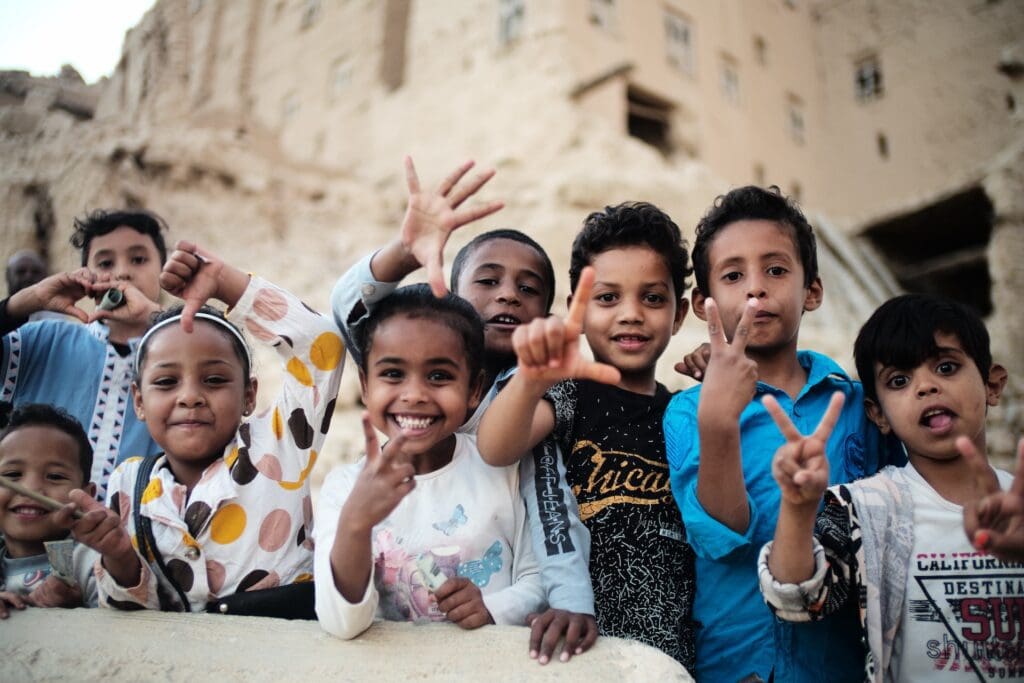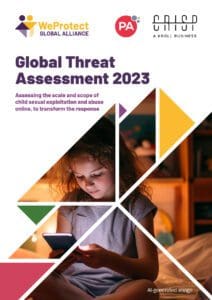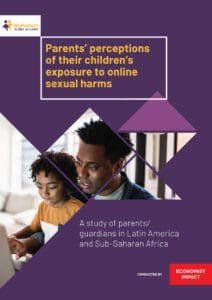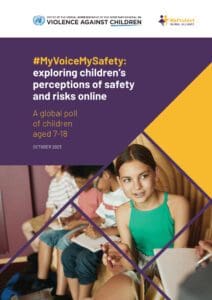We have to break out of silence

GLOBAL THREAT ASSESSMENT 2023
Other opinions in this series →
Ruwaida, Youth Participant, Democracy School Yemen
The expansion of the Internet across the world continues rapidly, the latest developments include artificial intelligence technologies and the Internet of things. The various digital platforms, especially social networks, have won the minds and hearts of users, especially adolescents and youth.
With emerging technologies come multiple threats
In the countries of the Middle East, the nature of use differs from one country to another according to its technical and material capabilities, but they share the use of instant chats, electronic marketing, professional translation, exchange of news and clips, and the use of social networks and e-mail. Many of us are still far from Internet of Things technologies, despite the spread of smart cities in Arab countries such as Egypt and some Gulf countries.
But we can all see that with these emerging technologies come multiple threats, including cyber breaches and theft of users’ personal data for the purpose of financial extortion or sexual exploitation.
Young people cannot abandon the Internet with its increasing uses, as it now plays all social roles and can even replace traditional family sharing, economic opportunities and dissemination of text, audio and visual digital content. Governments and societies should protect these digital platforms in a manner that does not interfere with the freedom to obtain and use information.
Alongside this, they should adopt joint programs with Internet service providers to enable supervised e-learning through content moderation as well as encouraging family supervision that guarantees child safety.
More moderation needed
The scale of violations and sexual exploitation of children is increasing for several reasons, including the low moderation of some instant chat sites, which use financial incentives to groom children, especially girls.
In Yemen, children face two main types of sexual exploitation via the Internet. The first is due to the weak control over Internet cafes and hotels, which makes children accessing them easy prey for criminals seeking to abuse and exploit them. The second type is children’s exposure to pornographic clips which can lead to further victimisation or encourage pathways to harm because of the nature of the content.
The spread of inappropriate images in search engines and other platforms advertisements, the limited controls that prevent pornographic sites, and the ease in which children and adolescents can get around blocking tools are all risks. Although Yemen is one of the lagging countries in the field of communications and the Internet, the spread of smartphones and tablets among children and adolescents is already out of control, exposing them to serious risks, including sexual exploitation via the Internet.
Break out of silence
That is why we have to break out of silence and urge government institutions to protect children in real and virtual reality, and civil society organisations to educate parents in schools and elsewhere.
Young people need all those working in the field of child protection to:
- Strengthen the role of community structures to protect children from sexual exploitation via the Internet and digital content. For example, the local council in each district, sheikhs and neighbourhood leaders, and a children’s parliament dedicated to reviewing issues affecting children.
- Activate parental protection and control methods in the most popular digital platforms.
- Promote advocacy campaigns (local, regional, and international) to combat sexual exploitation of children via the Internet.
- Urge the state to enact laws to hold criminals accountable in cases of sexual exploitation of children via the Internet, such as a Child Rights Act.
- Coordinate training programs on protecting children from sexual exploitation via the Internet. This includes the training of government partners, community structures, parents and teenagers.
- Make recommendations to the security authorities to create safe spaces for accessing the internet such as public Internet cafes that guarantee children’s right to access information while protecting them from abuse and exploitation.
The problem is not simple when we find the indicators and reports continuing to rise, especially in the countries of the Middle East, where many still ignore the problem and do not act in a timely manner to protect children. But by listening to our voices as young people, and enacting this report’s recommendations, we can greatly improve children’s experiences of the digital world.
أهمية الإنترنت وفضاءات الإنترنت للشباب
توسع الانترنت كما نوعا في مختلف دول العالم، ونقل المجتمعات لمجالات مذهلة من الخدمات أدت الى اعتماد المنظمات والمؤسسات بمختلف أنواعها واحجامها الى استخدام الانترنت واخرها تقنيات الذكاء الاصطناعي وانترنت الاشياء، ويمكن القول إن المنصات الرقمية المختلفة خاصة شبكات التواصل الاجتماعي حازت على عقول وقلوب المستخدمين وخاصة اليافعين والشباب. في بلدان الشرق الأوسط يختلف طبيعة الاستخدام من دولة الى أخرى حسب قدراتها الفنية والمادية ولكنها تشترك في استخدام الدردشات الفورية والتسويق الالكتروني والترجمة الاحترافية وتبادل الاخبار والمقاطع واستخدام شبكات التواصل الاجتماعي والبريد الالكتروني. وما زلنا بعيدين عن تقنيات انترنت الأشياء رغم انتشار المدن الذكية في دول عربية مثل مصر وبعض دول الخليج. مع هذا هناك تهديدات متعددة منها الاختراقات السيبريانية وسرقة البيانات الشخصية للمستخدمين بهدف الابتزاز أو الاستغلال المالي أو الجنسي.
نخلص أن الشباب لا يمكنهم التخلي على الانترنت مع تعاظم استخداماته فهو الان يلعب كل الأدوار الاجتماعية ويحل محل التشارك الاسري وكذلك الدور الاقتصادي ونشر المحتوي الرقمي النصي والصوتي والمرئي. وينبغي على الحكومات والمجتمعات المدنية حماية هذه المنصات الرقمية بما لا يتعارض مع حرية الحصول على المعلومات واستخدامها.
رؤيتهم للمستقبل استجابة لمواضيع وبيانات GTA
ساعدني والدي في فهم بيانات GTA التي اطلعت عليها بعد ترجمتها للعربية مع العلم أنني اتعلم اللغة الإنجليزية في احد المعاهد في صنعاء. أن حجم الانتهاكات والاستغلال الجنسي للأطفال في ازديا لأسباب متعددة منها انخفاض الرقابة على بعض مواقع الدردشات الفورية والتي تستخدم المحفزات المالية لاصطياد الأطفال وخاصة الفتيات. في اليمن يواجه الأطفال تعتيم لما يتعرضون له من استغلال جنسي عبر الانترنت ويمكن تقسيم ذلك لنوعان من الاستغلال عبر الانترنت الأول ضعف الرقابة على مقاهي الانترنت والفنادق والتي تجعلهم صيد سهل للمجرمين وترويج تلك الانتهاكات، والنوع الثاني استخدام الأطفال للمقاطع الإباحية (للبالغين) والتي تسبب لهم الانحراف الأخلاقي والاضطراب النفسي وتمثل 44% من إحصائية دار التوجيه الاجتماعي للعام 2022 للأطفال في خلاف مع القانون. وبرغم أن اليمن من الدول المتخلفة في مجال الاتصالات والإنترنت، إلا أن انتشار الهواتف الذكية والأجهزة اللوحية بين الأطفال والمراهقين خارج عن السيطرة، وهذا يعرضهم لمخاطر جسيمة، ومنها الاستغلال الجنسي عبر الإنترنت ويستخدم فيه العبارات العاطفية والصور التي يمكن أن نصنفها انها محرضة. كذلك من الأسباب التي تؤثر على سلوك الطفل انتشار الإعلانات ذات الصور غير اللائقة في إعلانات قوقل ومحدودية الضوابط التي تمنع المواقع الإباحية وسهولة التطبيقات التي تسمح للأطفال والمراهقين من كسر الحجب.
لهذا علينا أن نخرج من الصمت والتعتيم ونحث المؤسسات الحكومية على حماية الأطفال في الواقع الحقيقي والافتراضي وأن تعمل منظمات المجتمع المدني على توعية الآباء في المدارس وغيرها.
دعوة إلى العمل (استجابة لمواضيع وبيانات GTA)
يحتاج الشباب العاملين في مجال حماية الأطفال الى العديد من الأنشطة منها:
تعزيز دور الهياكل المجتمعية لحماية الأطفال من الاستغلال الجنسي عبر الإنترنت والمحتوى الرقمي.
تفعيل أساليب حماية الوالدين والرقابة الابوية في المنصات الرقمية الأكثر شعبية.
حملات مناصرة (محلية، إقليمية، دولية) لمناهضة الاستغلال الجنسي للأطفال عبر الانترنت.
حث الدولة على وضع قوانين لمحاسبة المجرمين في قضايا الاستغلال الجنسي للأطفال عبر الانترنت.
زيارات لمنظمات مدنية تعمل في مجال حقوق الطفل وحماية الأطفال بهدف التنسيق لبرامج تدريب حول وسائل حماية الأطفال من الاستغلال الجنسي عبر الانترنت.
عمل توصيات للجهات الأمنية لمنع تواجد الأطفال في البؤر التي تساعد على الاستغلال الجنسي ثم التنسيق مع وزارة الداخلية لتحديد بؤر الاستغلال الجنسي للأطفال (مثل مقاهي الإنترنت العامة – الفنادق ذات التوصيلات الرقمية المشفرة – الحمامات العامة) لمنع تواجد الأطفال دون هدف.
رويدا عبدالرحمن سناح
Read the report
Related reports
Page last updated on 12th December 2023


